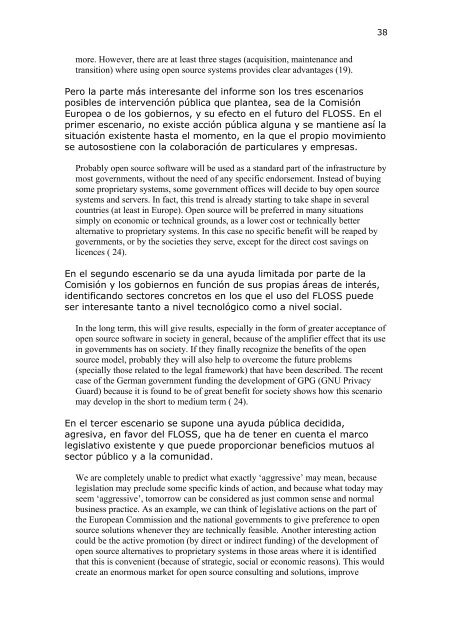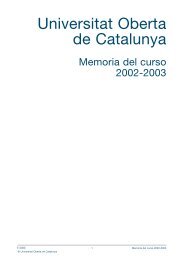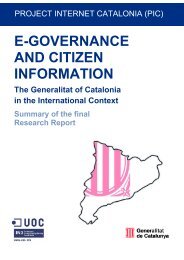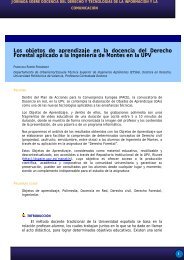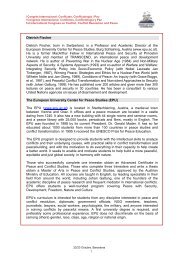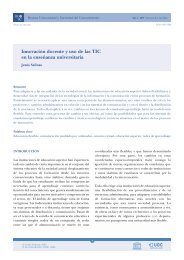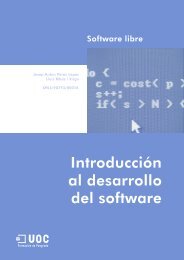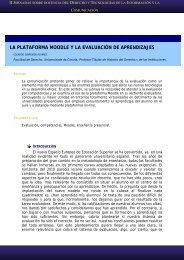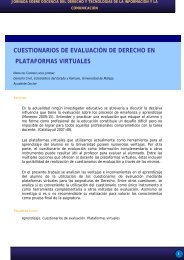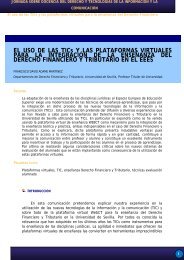El uso del software libre en las administraciones públicas de la UE
El uso del software libre en las administraciones públicas de la UE
El uso del software libre en las administraciones públicas de la UE
You also want an ePaper? Increase the reach of your titles
YUMPU automatically turns print PDFs into web optimized ePapers that Google loves.
38more. However, there are at least three stages (acquisition, maint<strong>en</strong>ance andtransition) where using op<strong>en</strong> source systems provi<strong>de</strong>s clear advantages (19).Pero <strong>la</strong> parte más interesante <strong><strong>de</strong>l</strong> informe son los tres esc<strong>en</strong>ariosposibles <strong>de</strong> interv<strong>en</strong>ción pública que p<strong>la</strong>ntea, sea <strong>de</strong> <strong>la</strong> ComisiónEuropea o <strong>de</strong> los gobiernos, y su efecto <strong>en</strong> el futuro <strong><strong>de</strong>l</strong> FLOSS. En elprimer esc<strong>en</strong>ario, no existe acción pública alguna y se manti<strong>en</strong>e así <strong><strong>la</strong>s</strong>ituación exist<strong>en</strong>te hasta el mom<strong>en</strong>to, <strong>en</strong> <strong>la</strong> que el propio movimi<strong>en</strong>tose autososti<strong>en</strong>e con <strong>la</strong> co<strong>la</strong>boración <strong>de</strong> particu<strong>la</strong>res y empresas.Probably op<strong>en</strong> source <strong>software</strong> will be used as a standard part of the infrastructure bymost governm<strong>en</strong>ts, without the need of any specific <strong>en</strong>dorsem<strong>en</strong>t. Instead of buyingsome proprietary systems, some governm<strong>en</strong>t offices will <strong>de</strong>ci<strong>de</strong> to buy op<strong>en</strong> sourcesystems and servers. In fact, this tr<strong>en</strong>d is already starting to take shape in severalcountries (at least in Europe). Op<strong>en</strong> source will be preferred in many situationssimply on economic or technical grounds, as a lower cost or technically betteralternative to proprietary systems. In this case no specific b<strong>en</strong>efit will be reaped bygovernm<strong>en</strong>ts, or by the societies they serve, except for the direct cost savings onlic<strong>en</strong>ces ( 24).En el segundo esc<strong>en</strong>ario se da una ayuda limitada por parte <strong>de</strong> <strong>la</strong>Comisión y los gobiernos <strong>en</strong> función <strong>de</strong> sus propias áreas <strong>de</strong> interés,id<strong>en</strong>tificando sectores concretos <strong>en</strong> los que el <strong>uso</strong> <strong><strong>de</strong>l</strong> FLOSS pue<strong>de</strong>ser interesante tanto a nivel tecnológico como a nivel social.In the long term, this will give results, especially in the form of greater acceptance ofop<strong>en</strong> source <strong>software</strong> in society in g<strong>en</strong>eral, because of the amplifier effect that its usein governm<strong>en</strong>ts has on society. If they finally recognize the b<strong>en</strong>efits of the op<strong>en</strong>source mo<strong><strong>de</strong>l</strong>, probably they will also help to overcome the future problems(specially those re<strong>la</strong>ted to the legal framework) that have be<strong>en</strong> <strong>de</strong>scribed. The rec<strong>en</strong>tcase of the German governm<strong>en</strong>t funding the <strong>de</strong>velopm<strong>en</strong>t of GPG (GNU PrivacyGuard) because it is found to be of great b<strong>en</strong>efit for society shows how this sc<strong>en</strong>ariomay <strong>de</strong>velop in the short to medium term ( 24).En el tercer esc<strong>en</strong>ario se supone una ayuda pública <strong>de</strong>cidida,agresiva, <strong>en</strong> favor <strong><strong>de</strong>l</strong> FLOSS, que ha <strong>de</strong> t<strong>en</strong>er <strong>en</strong> cu<strong>en</strong>ta el marcolegis<strong>la</strong>tivo exist<strong>en</strong>te y que pue<strong>de</strong> proporcionar b<strong>en</strong>eficios mutuos alsector público y a <strong>la</strong> comunidad.We are completely unable to predict what exactly ‘aggressive’ may mean, becauselegis<strong>la</strong>tion may preclu<strong>de</strong> some specific kinds of action, and because what today mayseem ‘aggressive’, tomorrow can be consi<strong>de</strong>red as just common s<strong>en</strong>se and normalbusiness practice. As an example, we can think of legis<strong>la</strong>tive actions on the part ofthe European Commission and the national governm<strong>en</strong>ts to give prefer<strong>en</strong>ce to op<strong>en</strong>source solutions wh<strong>en</strong>ever they are technically feasible. Another interesting actioncould be the active promotion (by direct or indirect funding) of the <strong>de</strong>velopm<strong>en</strong>t ofop<strong>en</strong> source alternatives to proprietary systems in those areas where it is id<strong>en</strong>tifiedthat this is conv<strong>en</strong>i<strong>en</strong>t (because of strategic, social or economic reasons). This wouldcreate an <strong>en</strong>ormous market for op<strong>en</strong> source consulting and solutions, improve


